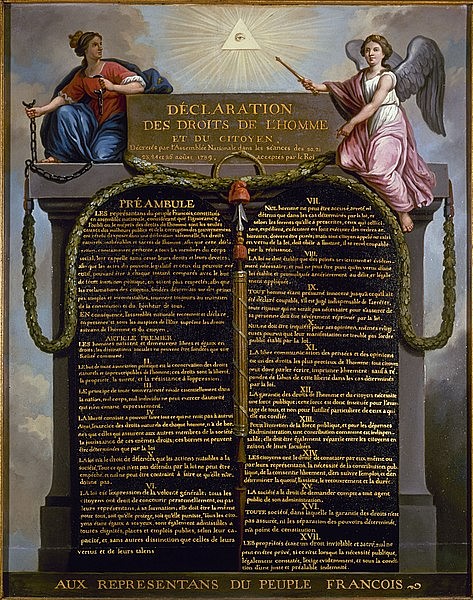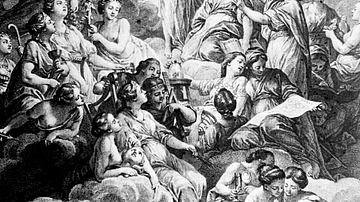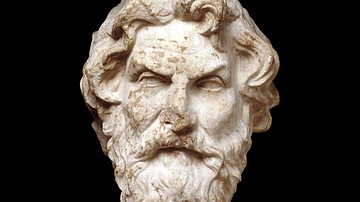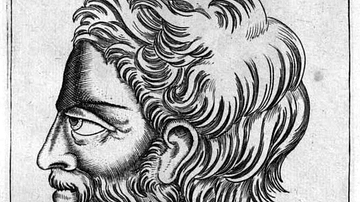
Montesquieu (1689-1757) was a French philosopher whose ideas in works like The Spirit of the Laws helped launch the Enlightenment movement in Europe. His ideas on the separation of powers, that is, between the executive, legislative, and judiciary, were influential on other Enlightenment thinkers and on the 13 colonies that became the United States of America.
Early Life
Charles-Louis de Secondat, Baron de la Brède, now known simply as Montesquieu, as his full name suggests, was born into a noble family near Bordeaux, France, on 18 January 1689. He inherited the barony of La Brède in 1696. First educated by the Oratorians (a Catholic religious order) at the Collége de Juilly, Montesquieu then studied law at the University of Bordeaux. On graduating in 1708, he began his career in law, practising in Bordeaux's Parlement (a sovereign court). Montesquieu became a judge in 1714. In 1715, he married Jeanne de Lartigue, a woman of independent means; the couple went on to have three children. In 1716, in the peculiar French system of passing on legal titles and roles, Montesquieu inherited both the barony of Montesquieu and the position of Président à mortier in the Bordeaux Parlement from a late uncle. He then went on to sell the same title in 1725 after he decided to retire from the toil of working life at the age of 36.
Montesquieu had independent means thanks to his family's estate at La Brède, which included large areas of farmland and vineyards. The historian H. Chisick describes Montesquieu's estate management as "practical, hard-headed, and parsimonious" (281). Here he now spent most of his time. Besides personally inspecting what his estate workers got up to, he was keen to increase his knowledge of literature and write down a few thoughts on political systems past and present.
Persian Letters
Montesquieu had long been interested in intellectual pursuits beyond the field of law. He had been elected to the Academy of Bordeaux in 1716. He published his Lettres persanes (Persian Letters) in 1721. This work, the first of what we today would call the author's thoughts regarding the Enlightenment, "succeeds in presenting the most serious subjects in a thoroughly entertaining fashion, thus breaking with the tradition of the heavy learned treatise" (Chisick, 282). Montesquieu uses the fictional characters of two noble Persians who are travelling in France and who correspond with friends and wives back home as a device to present all kinds of ideas. There is even a love story running through the book. The device of the Persian tourists perhaps allowed some of the more radical ideas to pass the censors since the author could claim that these thoughts were merely being expressed by an 'ignorant' foreigner and did not reflect Montesquieu's own position.
Persian Letters was published anonymously in the Netherlands, perhaps because the author was unsure how his radical ideas would be received, such as his veiled criticism of the authoritarian nature of absolute monarchs. Montesquieu presents his views through a criticism of Persian government, but what is really meant is a warning of how governance in France may descend into authoritarianism where a monarch's subjects are no better than slaves. The book also criticises religions since various faiths all claim absolute truth, which is impossible (i.e. only one faith can be correct). Reason is presented as a better tool than faith to govern how we live morally, but Montesquieu encourages toleration of different religious views. For Montesquieu, "The first aim of a religious man must be surely to please the divinity who established the religion he professes. But the most certain way to achieve this end is without any doubt to observe the rules of society and the duties of humanity" (Hampson, 104-5). Above all, natural law should rule humanity's thinking, and the dignity of the individual (for both men and women) should be of paramount concern to rulers. The book was a bestseller and was reprinted in several new editions.
A Growing Reputation as an Intellectual
Montesquieu participated in the famous salons of Madame Lambert (1647-1733) and Madame Tencin (1681-1749) in Paris through the 1720s. Salons were informal meetings where guests, selected for their wealth or intellectual talents (or both in Montesquieu's case) ate, drank, mingled, learnt of the latest developments in all the intellectual pursuits and the arts, and exchanged ideas.
Montesquieu's academic interests initially focussed on natural history and physics. It may be that Montesquieu was attracted to the regularity and laws seen in nature, something he now aspired to apply to political philosophy. The writer occasionally wrote poetry, too, such as the erotic verse Temple de Gnide. Recognition of Montesquieu's worthiness as an intellectual came in 1727 when was elected to the prestigious Académie Française.
Between 1728 and 1731, Montesquieu broadened his horizons and travelled to Germany, Austria, Italy, the Netherlands, and England. Significantly, perhaps, his wife did not accompany him on these travels. In 1731, he settled down at home to order his thoughts on the ideal political system. He was keen to study what had gone on before in earlier political systems, notably publishing in 1734 his appraisal of ancient Rome in Considérations sur les causes de la grandeur des Romains et de leur décadence (Considerations on the Greatness and Decline of the Romans). The culmination of Montesquieu's political ideas came in his De L'Esprit des lois (The Spirit of the Laws), published in 1748 in Switzerland.
The Spirit of the Laws
Montesquieu essentially founded political science in The Spirit of the Laws, a monumental work that combines history, anthropology, and political theory. His research into ancient and contemporary societies and his assessment of the pros and cons of their political systems was a new approach to trying to find a better way to govern a state. This activity, which other thinkers of the Enlightenment also pursued, owed a debt to the Scientific Revolution (1500-1700), where scientists (alternatively called natural philosophers) sought to explain the world using what we today would call universal laws, mathematics, facts, and reason. If nature has universal laws (for example, gravity), then humanity, being a part of nature, must also possess universal codes of moral behaviour. Perhaps, then, Montesquieu's greatest contribution to the Enlightenment movement was that, armed with reason and 'science', he provided a blueprint for how to go about finding the ideal political system by studying all aspects of human behaviour and society; in this, he was, in effect, the first sociologist.
A key idea in The Spirit of the Laws is the separation of powers, that is, the belief that a system where branches of government are separated and independent of each other limits the potential to abuse the rights of an individual. Montesquieu was not the first philosopher to propose the idea since it was suggested by the English philosopher John Locke (1632-1704) in his Second Treatise on Government, published in 1690. Montesquieu developed the idea, and it was his view that the executive (e.g. a monarch), legislative (e.g. a popular parliament), and judiciary (e.g. the system of laws) should be separated in order to preserve the liberty of the individual. If too much power is concentrated in one branch, particularly the executive, then this results in despotism. The historian R. Robertson summarises the function of the three powers in Montesquieu's separation: "The power to frame the laws must belong to one body; the power of executing them or putting them into practice must belong to another; and judgement on whether the laws have been executed properly must belong to a third" (517). If one branch has all three roles, then this is despotism.
Montesquieu believed the best (but not perfect) example of what was required in terms of a separation of powers was already in existence in England, where the monarchy, House of Lords, and House of Commons shared power with the judiciary. Montesquieu was preoccupied, though, with the political situation in France, and all of his work is a reflection of the troubled times in that country, which would terminate explosively in the French Revolution in 1789. The philosopher was eager to preserve the role of his own aristocratic class, which was threatened by an authoritarian monarchy above it and an unruly population of commoners below it. When he calls for a balance of power, Montesquieu is not calling for a wholesale change to France's political system. Rather, he is providing a means by which the monarchy and aristocracy might work together better (and who are also the principal audience for his writing). Remembering that he was first and foremost a lawyer and judge, Montesquieu calls for restraint in abandoning well-established laws. Laws, even though they are not perfect, must be preserved by legislators who should "only touch them with a trembling hand" (Hampson, 112). Montesquieu is not suggesting a revolution but a careful manipulation of the existing political system in order to preserve it, a hope that was savagely cut to pieces by the guillotine a few decades after his death.

Montesquieu was also concerned in his great book with demonstrating how current political systems had come about so that the people who lived under these systems could better understand why certain institutions and conventions existed (again a justification for the existing imperfect political system). He was particularly concerned that governments should allow the people to become better citizens. He believed the best way to do this was to guarantee two things that he saw as self-evident positives: liberty and justice. These were essential precisely because good government is not the only thing humans need. Montesquieu noted that: "Men are governed by many things: climate, religion, the laws and precepts of government, the examples of the past, habits, manners. From the sum of these emerges a general spirit" (Cameron, 284). Montesquieu's idea that climate affects human nature and character – an area he devotes many pages to discussing – are now hopelessly outdated, but this does not seriously damage his political arguments since the general point he is making is that humanity is affected by many things, climate being just one (and one of the least important).
In the proper political environment, then, people will naturally work for the general good of society since Montesquieu believed that nature must have intended people to live in peaceful societies because they possess a desire and talent for social interaction and an instinctive moral code. Further, and much more practically, Montesquieu wrote that a society will naturally work if its government allows it to since "everyone pursues the common good under the impression that he is following his own private advantage" (Hampson, 100). Here, Montesquieu is arguing that a good government need and should not interfere too much in people's lives.
Along the same lines, Montesquieu argues that religion should be tolerated because he believes that the aim of Christians (and believers of other religions) should be to please God by being good humans. In other words, religious beliefs do not prevent the formation of good government or good citizens. Business and commerce are also beneficial to society because, he believed, these activities help to bind society together. Further, the desire for commerce ensures that different societies and groups within the same society engage in peaceful relations so that more business can be conducted more profitably. Finally, Montesquieu regarded different societies, which he considered were like natural organisms, as being essentially the same in all of the above aspirations, at least in Europe. Hence he described himself as "a human being of necessity and a Frenchman by accident" (Cameron, 281). This belief in a common human necessity for liberty, fairness, and happiness also led Montesquieu to denounce slavery as abominable.

Montesquieu's greatest work was well-received by enlightened thinkers and sold a great many copies for an academic work. The historian N. Hampson notes that the book "appeared in twenty-two editions within eighteen months of publication, which implied sales in the region of 35,000 copies" (128). It did receive criticism from some church figures who eventually succeeded in having it added to the Catholic Church's Index of Prohibited Books in 1751. This, despite Montesquieu preempting them by writing a rousing defence of his ideas the year before in Défense de L'Esprit des lois (Defence of the Spirit of the Laws). Conservatives were not amused either, as they considered Montesquieu's ideas far too sceptical regarding those who already held power and their capacity to rule benevolently for the good of all.
Influence on the Thirteen Colonies
In more practical terms, Montesquieu's ideas on the necessity of liberty, the separation of powers, that governments should permit rather than enforce, and that republics should gather together in a federal union for mutual strength, all greatly influenced those leaders in the Thirteen Colonies in North America who were keen to break away from the British Empire and form their own system of joint government. Juicy quotes were taken from The Spirit of the Laws and taken by the colonials as being particularly relevant to George III of Great Britain (r. 1760-1820) – lines like "constant experience shows that every man invested with power is apt to abuse it" and "it is necessary from the very nature of things that power should be a check to power" (Bk XI, ch. 4). The Americans took the idea of a separation of powers and made it central to their political system, although one might agree with Montesquieu's critics that too many checks within a system that prioritises a balance of power risks leaving no part of government able to wield sufficient power to function independently.
Major Works by Montesquieu
Essay on Natural History (1717)
Persian Letters (1721)
Temple de Gnide (1725)
Essay on Taste (1726)
Considerations on the Greatness and Decline of the Romans (1734)
The Spirit of the Laws (1748)
Defence of the Spirit of the Laws (1750)

Death & Legacy
Montesquieu died in Paris on 10 February 1755. On his deathbed, at least according to an Irish Jesuit, he converted to Catholicism. When alive, Montesquieu was a deist, that is, someone who believes in the presence of God as a creator but believes that, much like a watchmaker who then abandons his work, God is not available for communication or interaction in the world he created. In short, religion and all its ceremonial and ritual trappings serve the needs of humanity rather than God. Perhaps Montesquieu was just hedging his bets in his final moments.
Of all the philosophers of the Enlightenment, Montesquieu "was probably the one whose work was most widely appreciated and accepted during the 18th century, and the least controversial" (Chisick, 281). For a rather mild political thinker, Montesquieu's work was championed by revolutionaries, both in France and the United States. Rulers were also interested in these new ideas. Catherine the Great (r. 1762-1796), for example, tasked a Legislative Commission to draft a new law code in 1767, and many of Montesquieu's ideas in The Spirit of the Laws heavily influenced this code.
Montesquieu's ideas on the separation of powers continue to inspire those who seek fairer government and, through such devices as devolved parliaments, a political system where the power of one branch is severely limited by all the others. Montesquieu is today widely regarded as one of the most important of all political philosophers and certainly of the French Enlightenment, in which context, he is part of the seemingly inseparable quartet of philosophes with Voltaire (1694-1778), Jean-Jacques Rousseau (1712-1778), and Denis Diderot (1713-1784). All four have become essential components of any curriculum covering political philosophy.






